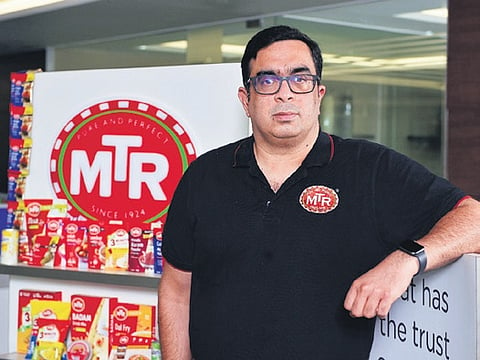MTR: Blending tradition with innovation for 100 years
BENGALURU: A hundred years ago, in the Mavalli locality of Bangalore, a brand was born that would emerge as a household name, forever seasoning Karnataka’s palate. From its inception in 1924, MTR has grown in tune with the taste buds of discerning customers.
Taking forward a rich legacy steeped in tradition, MTR, which is celebrating its centenary this year, is reliving the flavours of the good old days, while innovating and evolving as a contemporary brand serving modern demand. Innovation has been a cornerstone for MTR since its founding. Brand MTR’s journey began with the MTR Restaurant in 1924. In 1975, it diversified into the business of convenience foods and instant mixes.
Elaborating, MTR Foods CEO Sunay Bhasin said, “Since the very beginning, it was always about giving solutions that customers needed, and we have been able to do so consistently, thanks to innovation. This innovation is not just in manufacturing or technology, but also with the kind of products we bring to the market.”
In 2007, Norwegian conglomerate Orkla acquired MTR Foods. Following its acquisition, MTR Foods continued with its time-honoured recipes and best practices that were perfected over decades. Along the way, it began to study and understand the pulse of a wider customer-base, and curate products for a larger market, eyeing expansion and diversification.
“India is known for its food diversity. Every home has its unique recipes. However, a lot of this recipe knowledge is fading away, because of generational changes. We wanted to ensure that we don’t lose touch with those recipes, and hence our products play a unique role. We have a rich knowledge-base of over 3,000 recipes, from which we plan products,” Bhasin told TNIE.
Today, MTR boasts of 145 products and 400 SKUs, spread under the categories of Masalas and Spices, Sweets (Mixes + Ready-to-Eat), Breakfast + Chilled, Badam Milk (Canned + Mix), Ready-to-Eat, and others. Around 50% of business is from Masalas and Spices.
“While Sambar, Rasam, Bisibele Bhath, Puliogare, Rava Idli, and Gulab Jamun, are popular, we constantly extend our range, keeping up with modern trends,” said Bhasin. Driving this extension is a well-travelled and aware customer. As tastes evolved, MTR responded by creating new offerings that began to attract newer patrons from a wider geography. A brand known for offering products tailormade for the South Indian kitchen, began catering to other regions as well. “We want to serve all the food needs of customers, so we have also launched products like Paneer Masala. We are able to serve traditional, as well as newer customers,” the CEO said.
Today, 90% of Karnataka’s households use MTR’s products. The state contributes 50% of its India sales.
Overtime, the brand introduced products suiting the changing lifestyles of customers too. In 2017, it launched its 3 Minute Breakfast, followed by MTR Minute Fresh in 2021, and Ready-to-Eat Sweets, Akki Rotti and Malabar Parota in 2023.
“We are now present in all big metros to villages with as little as 3,000 people. Around 20% of sales come from the rural market,” said Bhasin, adding that on the product front, there is scope to grow in Masalas, Breakfast and Ready-to-Eat Sweets. Its factory in Bommasandra in Bengaluru, which houses seven plants, serves 95% of MTR’s manufacturing needs, with the remaining 5% handled through contract manufacturing.
Orkla India is expected to grow 10-12% year-on-year, with its current business size at Rs 2,200 crore. MTR is expected to contribute ~45% of the total business, a statement said.

